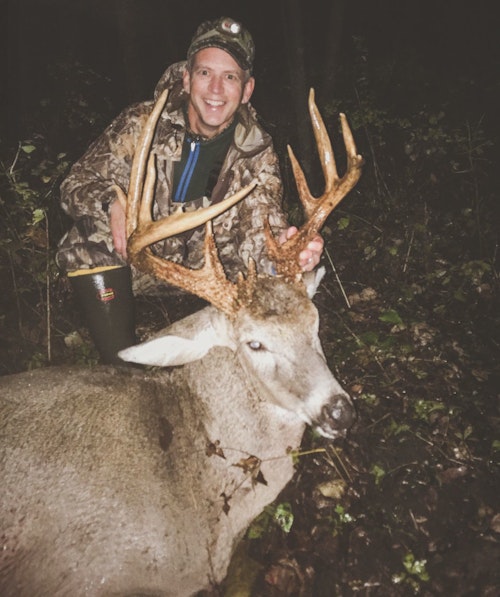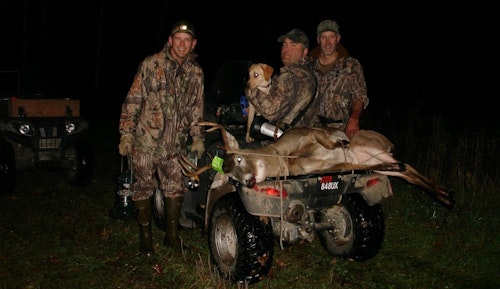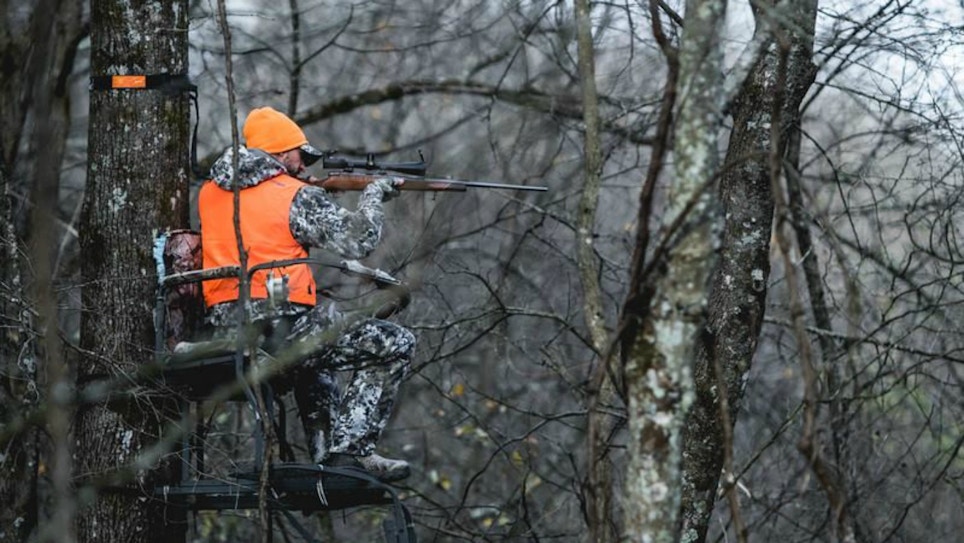In the old days, deer hunters could justify staying inside during rainy days because their clothing wasn’t waterproof, or if it did block the rain, it was too noisy. Thankfully, today’s deer hunters have no such excuses. Modern, high-quality rain coats and rain pants designed specifically for deer hunting are 100 percent waterproof and whisper quiet.
Assuming you own the gear needed to stay dry and comfortable in the field when it’s raining, does it makes sense? I’ve debated this topic with my hunting buddies, and here’s my two cents.
Whitetail Deer Hunting in the Rain: Pros
- Deer will be moving. Sure, if it’s an absolute downpour, whitetails will probably hunker down, but otherwise deer seem to like the fact they can move through the forest silently.
- Damp conditions on the forest floor enable you to move quietly through the woods, making it ideal for still-hunting or spot and stalk.
- While damp conditions seem to benefit a deer’s sense of smell, a heavy rain works to a hunter’s advantage by washing away ground scent. It also seems to keep airborne scent localized near the base of a treestand.
- In my experience, rain gear seems to contain human odor better than non-waterproof garments. For that reason, I often wear rain gear even when rain isn’t in the forecast.
- Less hunting pressure. A friend once asked me, “What’s the best weather for muskie fishing?” I said, “Anything that keeps other anglers off the water.” The same could be said for whitetails if hunting pressure is a major factor in your area.
- The sound of raindrops hitting the forest floor will help cover your noise in a treestand.
- When it’s raining hard, leaves and branches being hit by droplets are moving slightly, which helps cover your movement.
- Deer really like to move after long periods of heavy rain kept them bedded. Being in a treestand when heavy rain finally stops or lessens can be outstanding.

The author arrowed this mature buck in Kansas during a consistent drizzle. The buck ran only 80 yards after the arrow penetrated both his lungs, and blood was difficult to follow due to the rain.
Whitetail Deer Hunting in the Rain: Cons
- The biggest downside to deer hunting in the rain is blood trailing. During a mist, blood trailing is doable, but as soon as it turns from mist to rain, blood is quickly washed away. I’ll gun hunt in a downpour because I know I can anchor a deer in its tracks with a well-placed shot. When bowhunting, however, there comes a time when I leave the woods because I wouldn’t take even the closest broadside shot because of constant hard rain.
- It can be slippery climbing with screw-in tree steps, sticks and ladders in the rain. And if the temperature drops while you’re in a treestand and the moisture freezes, then the climb down will be extremely dangerous. (Always climb with a LifeLine or similar safety product!) Also, because tree bark is slippery when wet, use great care when using climbing stands in the rain.
- Rain makes it difficult to see through a firearm scope. Sure, protective scope covers and caps help, but it’s still a hassle.
- Rain can turn a dependable muzzleloader into one that fails to fire because moisture compromised the black powder or its substitute (Pyrodex, Triple 7, etc.). At a minimum, black powder hunters should use a tight-fitting cover over the gun’s muzzle to prevent moisture from dripping down the barrel.
- Bowhunters who choose feathers over vanes need to understand that rain-soaked feathers won’t perform as they do when dry. To prevent this, bowhunters should use water-repellent powder to treat feather fletching before heading into the field.
- Depending on where you’re staying during a deer hunt, drying rain-soaked clothes can be a problem. For example, is it worth hunting in the rain during the morning if you know it will be impossible to dry your garments before the afternoon deer hunt?
- You’ll need to clean/dry firearms and archery gear after a rainy day hunt to prevent rust and other problems.

The author (left) was part of a rain-soaked blood trailing crew who finally found his buddy’s archery buck.






